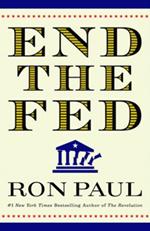Monetary Policy and The State of the Economy hearing before the Committee on Financial Services, U.S. House of Representatives, July 18, 2007
 The CHAIRMAN. The gentleman from Texas, Mr. Paul, the ranking member of the subcommittee.
The CHAIRMAN. The gentleman from Texas, Mr. Paul, the ranking member of the subcommittee.
Dr. PAUL. Thank you, Mr. Chairman, and welcome Chairman Bernanke. I share your concern for the inequality that has developed in our country. I think it is very real, I think it is a source of great resentment, and unfortunately, I think it is one of those things that puts a lot of pressure on Congress to increase the amount of government programs and government spending, which I do not think is the answer. I believe the inequality comes specifically from the type of currency we have. When there is a deliberate debasement of a currency, it is predictable that the middle class is injured, the poor are hurt, and there is a transfer of wealth to the wealthy, and until we understand that, I do not believe we can solve this problem. And if we resort to continued monetary inflation and more government programs, we will only make this inequality worse. This is exactly the opposite of what happens when you have a sound currency and free markets, because it is the sound currency and free markets which creates the middle class and creates prosperity and allows the best distribution of this wealth. Inflation is a monetary phenomenon. It comes from the Federal Reserve System. The Federal Reserve has tremendous pressure put on them, because almost everybody wants low interest rates, except if you happen to be a saver, then you might not like artificially low interest rates. But, of course, that contributes to the lack of savings, which is another problem that we have in this country. We concentrate on inflation by implying, and everybody casually accepts that inflation is a price problem. But the prices that go up are one of the consequences of inflation. Inflation causes malinvestment, it causes excessive debt, and it causes financial bubbles that we have to deal with. But we have a lot of information today available to us to show that there is a lot of monetary inflation going on. For instance if you look at MZM, it is growing at almost a 9 percent rate. M3 is no longer available to us from official sources, but private sources tell us it is growing at a 13 percent rate. Of course, we can reassure ourselves and say that the CPI is growing at a 2.6 percent rate. But if you go back to the old method of calculating the CPI, closer to what the average person is suffering, and one of the reasons why there is inequality going on, is it is growing at over a 10 percent rate. The fact that the dollar is weak on the international exchange markets cannot be ignored. For instance, in just 6 months, the Canadian dollar increased 11 percent against our dollar. This should stir up some concerns. But one concern that I have, that I think is causing more problems and keeps us from coming to a solution, is the divorce between the exchange value of a dollar on the international exchange markets and the effort to lower the value of a dollar in order to increase exports, which can only be done through inflation, at the same time, believing that we can have stability in prices at home, because that is a disconnect that is not possible. If we strive for a lower dollar in exchange markets, we will have price increases here at home and we have to deal with it. I yield back.
[break]
The CHAIRMAN. The gentleman from Texas.
Dr. PAUL. Thank you, Mr. Chairman. I find it rather ironic that the Federal Reserve has complete control over the money supply, yet it is the Treasury that is supposed to protect the value of the dollar. It seems like you have a little bit of responsibility for the value of the dollar as well. I have a question about the GDP. In the first quarter, our GDP did not do so well; it was less than 1 percent. Our population growth averages about 1.5 percent. So, if we have total wealth divided by the population, we actually have negative growth. Could this not be a part of the explanation as to why some people feel there is inequality and that they are not doing as well in the economy? Wouldn’t this explain some of the concerns that we have?
Mr. BERNANKE. Well, Congressman, that was, of course, a single quarter, and there were a number of temporary factors that held down GDP growth in the first quarter, including the liquidation of the inventory overhang, which I mentioned before, a swing in our trade balance — a temporary swing — and a temporary decline in Federal defense spending. All of those things have been reversing now, so I think we will be seeing in the second quarter something closer to a 3 percent growth. Between the first half of the year overall, it will be a more healthy rate of growth.
Dr. PAUL. We have a savings rate which is negative, and if we had true capitalism, this would be very, very serious because we would have no savings and no capital to invest. Today, with our monetary system, we resort to other means. We can create credit and money out of thin air, and it acts as capital by stealing value from the existing currency, and we have been doing that for a long time, so the process can continue, but it literally is inflation. Also, we can resort to borrowing overseas, and we are permitted, because we have the reserve currency of the world, to export our inflation, and that seems to be a free ride for us as well. How long can we fool the world? How long can we continue with the current account deficit of 6 percent? If our productive jobs are going overseas — and like the gentleman mentioned earlier about more jobs going overseas — eventually, this is going to catch up with us. Is it conceivable that we could live on capital formation by the creation of money and credit out of thin air? If that is the case, we would never have to go to work again if that is true. It seems like we really have to go to work. We really have to save, and we really have to invest, and we really have to get these jobs back. But I see so many of our problems as a consequence of a monetary system that discourages savings and encourages a free ride for us because there is still a lot of trust for the dollar, although that trust is going down every day. I think we have to face up to the consequences of what this might mean to us.
 Mr. BERNANKE. Well, first, our national savings includes corporate savings as well as household savings. If you put those together, you get a positive number, so there is some net savings going on in the United States. Congressman, you are absolutely right that we are also relying pretty heavily on borrowing from abroad, which is our current account deficit. I think that is sustainable for a while because foreigners seem quite interested in acquiring U.S. assets. We have very deep and liquid financial markets. However, I also agree with you that that is not a long-term, sustainable situation by any means, and we need to be working to try to bring that current account deficit down over time. In answer to a previous question, I talked a bit about the importance of a structural change — increasing savings here in the United States, increasing attention to domestic demand with our trading partners.
Mr. BERNANKE. Well, first, our national savings includes corporate savings as well as household savings. If you put those together, you get a positive number, so there is some net savings going on in the United States. Congressman, you are absolutely right that we are also relying pretty heavily on borrowing from abroad, which is our current account deficit. I think that is sustainable for a while because foreigners seem quite interested in acquiring U.S. assets. We have very deep and liquid financial markets. However, I also agree with you that that is not a long-term, sustainable situation by any means, and we need to be working to try to bring that current account deficit down over time. In answer to a previous question, I talked a bit about the importance of a structural change — increasing savings here in the United States, increasing attention to domestic demand with our trading partners.
Dr. PAUL. You did say in your talk that the predominant policy concern was inflation, which is encouraging that there is a concern. Of course, once again, inflation is a monetary phenomenon, and we have to deal with it. War sometimes is not healthy for a currency or for keeping prices down, at least inflation. It is hard to find throughout all of history when war did not create price inflation because, even in ancient times, countries resorted to clipping coins and diluting values or whatever — they inflated the currency — because people do not generally like to pay for the war. Yet, in the 1970’s, we had consequences of guns and butter. Now we are having guns and butter again, and we are having consequences, and it just looks like we may well come to a 1979/1980. Do you anticipate that there is a possibility that we will face a crisis of the dollar such as we had in 1979 and in 1980?
Mr. BERNANKE. The Federal Reserve is committed to maintaining low and stable inflation, and I am very confident we will be able to do that.
Dr. PAUL. So you are not answering whether or not you anticipate a problem.
Mr. BERNANKE. I am not anticipating a problem like in 1979 and in 1980, no.
Dr. PAUL. With your fingers crossed, I guess. Okay. Thank you.
Dr. Ron Paul is a Republican member of Congress from Texas.











